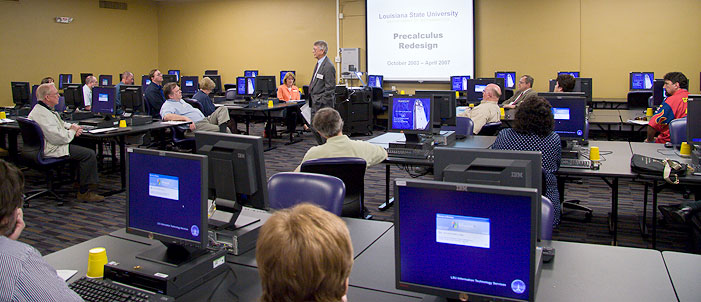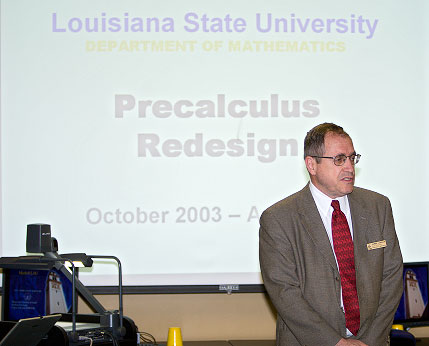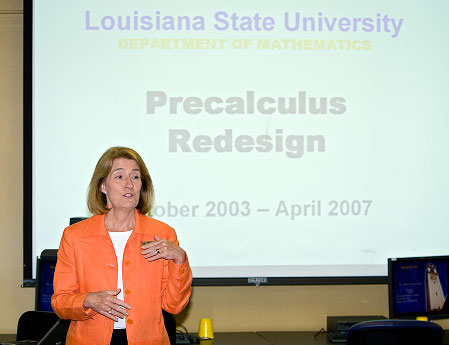The New Math: LSU becomes National Leader in Math Education
Redesign Workshop, April 12, 2007
 The LSU Department of Mathematics has spent more than three years developing a new approach to teaching college algebra and has since become a national leader in the field of using technology to redesign the delivery of large-enrollment college mathematics courses. This new approach uses a combination of small classroom instruction and a learning lab environment. LSU was accepted into the Roadmap to Redesign, or R2R, program in the summer of 2004. The program, developed by the National Center for Academic Transformation, or NCAT, fosters redesigning large enrollment courses through effective use of technology to reduce costs and increase student learning. LSU faculty members developed the delivery model they are now using with the help of NCAT redesign guidelines and after visiting other schools that were using these redesigned teaching methods. In the spring 2005 semester, LSU ran a small pilot program of the new classroom and learning lab format for Math 1021, or college algebra. In fall 2005, LSU ran a larger pilot, but it was difficult to interpret the results of the program because of the effect Hurricanes Katrina and Rita had on the entire LSU student population. In spring 2006, all college algebra students used this new model and the results were similar to results prior to the redesign.
The LSU Department of Mathematics has spent more than three years developing a new approach to teaching college algebra and has since become a national leader in the field of using technology to redesign the delivery of large-enrollment college mathematics courses. This new approach uses a combination of small classroom instruction and a learning lab environment. LSU was accepted into the Roadmap to Redesign, or R2R, program in the summer of 2004. The program, developed by the National Center for Academic Transformation, or NCAT, fosters redesigning large enrollment courses through effective use of technology to reduce costs and increase student learning. LSU faculty members developed the delivery model they are now using with the help of NCAT redesign guidelines and after visiting other schools that were using these redesigned teaching methods. In the spring 2005 semester, LSU ran a small pilot program of the new classroom and learning lab format for Math 1021, or college algebra. In fall 2005, LSU ran a larger pilot, but it was difficult to interpret the results of the program because of the effect Hurricanes Katrina and Rita had on the entire LSU student population. In spring 2006, all college algebra students used this new model and the results were similar to results prior to the redesign.  However, this past fall after adjusting a few details of the program, LSU saw lower-than-ever drop rates and a vast improvement in student success rates in the redesigned college algebra course. “The college algebra drop rate was six percent, which is phenomenally low. The success rate was 75 percent, which is exceptionally high. The national success rate average is 50 percent,” said Phoebe Rouse, precalculus program coordinator, who noted that the 75 percent success rate means that 75 percent of the students finished the course with either an A, B or C. The final exam median was 78 percent, which means that half of the students taking the final exam scored 78 percent or better on it. According to the Department of Mathematics, these results were so positive that Math 1022, or trigonometry, and Math 1023, or precalculus, are now being offered in this redesigned delivery method as well. In this new delivery model, students go to a traditional class one hour per week with a faculty member and then spend at least three hours per week in the learning lab. In the weekly one-hour class, the faculty member presents and reviews main ideas and provides overall guidance for the students as they progress through the course. In the learning lab, computer software provides algorithmically generated homework exercises and presents interactive help and detailed, worked-out examples along with videos. The lab is staffed with faculty members, math graduate students and undergraduate math majors who are available for individual assistance on demand. “Students spend less time in a formal classroom and don’t spend a lot of time passively sitting. They spend time doing,” Rouse said. “Students are doing more math than ever before. They are actively involved and can get immediate help.”
However, this past fall after adjusting a few details of the program, LSU saw lower-than-ever drop rates and a vast improvement in student success rates in the redesigned college algebra course. “The college algebra drop rate was six percent, which is phenomenally low. The success rate was 75 percent, which is exceptionally high. The national success rate average is 50 percent,” said Phoebe Rouse, precalculus program coordinator, who noted that the 75 percent success rate means that 75 percent of the students finished the course with either an A, B or C. The final exam median was 78 percent, which means that half of the students taking the final exam scored 78 percent or better on it. According to the Department of Mathematics, these results were so positive that Math 1022, or trigonometry, and Math 1023, or precalculus, are now being offered in this redesigned delivery method as well. In this new delivery model, students go to a traditional class one hour per week with a faculty member and then spend at least three hours per week in the learning lab. In the weekly one-hour class, the faculty member presents and reviews main ideas and provides overall guidance for the students as they progress through the course. In the learning lab, computer software provides algorithmically generated homework exercises and presents interactive help and detailed, worked-out examples along with videos. The lab is staffed with faculty members, math graduate students and undergraduate math majors who are available for individual assistance on demand. “Students spend less time in a formal classroom and don’t spend a lot of time passively sitting. They spend time doing,” Rouse said. “Students are doing more math than ever before. They are actively involved and can get immediate help.”  Other schools currently using designs similar to LSU’s for college algebra include the Virginia Polytechnic Institute and State University (Virginia Tech), University of Alabama, University of Idaho, University of North Carolina at Chapel Hill, University of North Carolina at Greensboro, Georgia State University, University of Mississippi and Wayne State University. Similar programs are under development at Northern Illinois University, DePaul University and the Houston and Alamo Community College Systems. With the success of LSU’s college algebra course, other institutions have begun to take notice. At a recent meeting of the four Louisiana college systems – LSU System, University of Louisiana System, Southern University System and the Louisiana Technical and Community College System – the LSU model for college algebra was highlighted by the featured speaker from NCAT. Rouse was asked to discuss LSU’s program during the meeting and as a result, numerous schools are planning to visit LSU’s campus this month to view LSU’s learning lab and discuss implementing similar programs. The course redesign workshop will be held April 12 and will include 25-30 institutions from Louisiana, Texas, Oklahoma, Arkansas and Maryland. The LSU math learning lab is located on the first floor and basement of Pleasant Hall and is open from 9 a.m. - 9 p.m. Monday through Thursday, 9 a.m. - 5 p.m. on Friday and 5 p.m. - 9 p.m. on Sunday. Students can attend the lab at any time during those hours. The LSU math learning lab was built with support from the LSU Student Technology Fee, the Louisiana Board of Regents, the Office of Academic Affairs, the College of Arts and Sciences, the Department of Mathematics and Boyd Professor Jimmie D. Lawson. For more information, contact Rouse at 225-578-2659 or rouse@math.lsu.edu. Text submitted by Ernie Ballard, LSU Media Relations, 225/578-5685, to LSU News.
Other schools currently using designs similar to LSU’s for college algebra include the Virginia Polytechnic Institute and State University (Virginia Tech), University of Alabama, University of Idaho, University of North Carolina at Chapel Hill, University of North Carolina at Greensboro, Georgia State University, University of Mississippi and Wayne State University. Similar programs are under development at Northern Illinois University, DePaul University and the Houston and Alamo Community College Systems. With the success of LSU’s college algebra course, other institutions have begun to take notice. At a recent meeting of the four Louisiana college systems – LSU System, University of Louisiana System, Southern University System and the Louisiana Technical and Community College System – the LSU model for college algebra was highlighted by the featured speaker from NCAT. Rouse was asked to discuss LSU’s program during the meeting and as a result, numerous schools are planning to visit LSU’s campus this month to view LSU’s learning lab and discuss implementing similar programs. The course redesign workshop will be held April 12 and will include 25-30 institutions from Louisiana, Texas, Oklahoma, Arkansas and Maryland. The LSU math learning lab is located on the first floor and basement of Pleasant Hall and is open from 9 a.m. - 9 p.m. Monday through Thursday, 9 a.m. - 5 p.m. on Friday and 5 p.m. - 9 p.m. on Sunday. Students can attend the lab at any time during those hours. The LSU math learning lab was built with support from the LSU Student Technology Fee, the Louisiana Board of Regents, the Office of Academic Affairs, the College of Arts and Sciences, the Department of Mathematics and Boyd Professor Jimmie D. Lawson. For more information, contact Rouse at 225-578-2659 or rouse@math.lsu.edu. Text submitted by Ernie Ballard, LSU Media Relations, 225/578-5685, to LSU News.